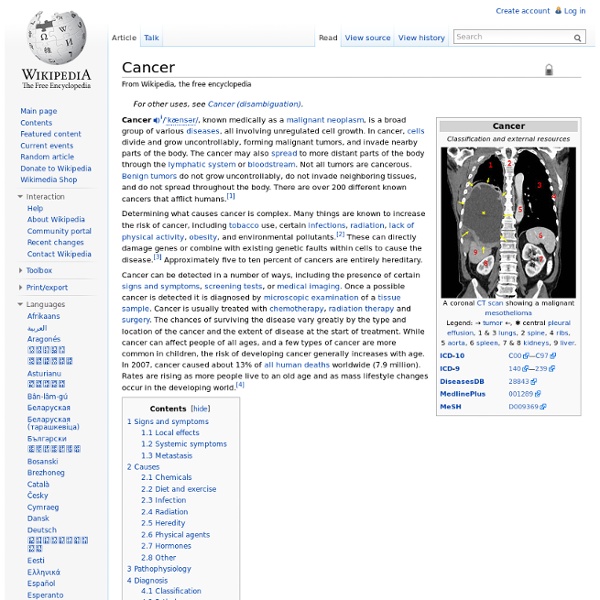Cancer

Tasmanian devil
The Tasmanian devil (Sarcophilus harrisii) is a carnivorous marsupial of the family Dasyuridae, now found in the wild only on the Australian island state of Tasmania. The size of a small dog, it became the largest carnivorous marsupial in the world following the extinction of the thylacine in 1936. It is characterised by its stocky and muscular build, black fur, pungent odour, extremely loud and disturbing screech, keen sense of smell, and ferocity when feeding. It is believed that ancient marsupials migrated from what is now South America to Australia tens of millions of years ago during the time of Gondwana,[3][4][5] and that they evolved as Australia became more arid. Devils are not monogamous, and their reproductive process is very robust and competitive. Since the late 1990s, devil facial tumour disease has drastically reduced the devil population and now threatens the survival of the species, which in 2008 was declared to be endangered. Taxonomy Genetics Description Feeding Culling
International Agency for Research on Cancer
The International Agency for Research on Cancer (IARC; French: Centre international de Recherche sur le Cancer, CIRC) is an intergovernmental agency forming part of the World Health Organization of the United Nations. Its main offices are in Lyon, France. Its role is to conduct and coordinate research into the causes of cancer. It also collects and publishes surveillance data regarding the occurrence of cancer worldwide.[1] It maintains a series of monographs on the carcinogenic risks to humans posed by a variety of agents, mixtures and exposures.[2] Following its inception, IARC received numerous requests for lists of known and suspected human carcinogens. In 1970, the IARC Advisory Committee recommended that expert groups prepare a compendium on carcinogenic chemicals, and it began publishing its monographs series with this aim in mind.[3] IARC categories[edit] The IARC categorizes agents, mixtures and exposures into five categories.[4] Industry influence and transparency[edit]
Hodgkin's lymphoma
Hodgkin lymphoma, also known as Hodgkin's lymphoma and Hodgkin's disease,[1] is a type of lymphoma, which is a cancer originating from white blood cells called lymphocytes. It was named after Thomas Hodgkin, a graduate of the University of Edinburgh Medical School, who first described abnormalities in the lymph system in 1832.[2][3] Hodgkin's lymphoma is characterised by the orderly spread of disease from one lymph node group to another and by the development of systemic symptoms with advanced disease. When Hodgkins cells are examined microscopically, multinucleated Reed–Sternberg cells (RS cells) are the characteristic histopathologic finding. Hodgkin's lymphoma may be treated with radiation therapy, chemotherapy, or hematopoietic stem cell transplantation, with the choice of treatment depending on the age and sex of the patient and the stage, bulk, and histological subtype of the disease. Classification[edit] Types[edit] Staging[edit] Signs and symptoms[edit] Cause[edit] Diagnosis[edit]
Home
Related:
Related:



